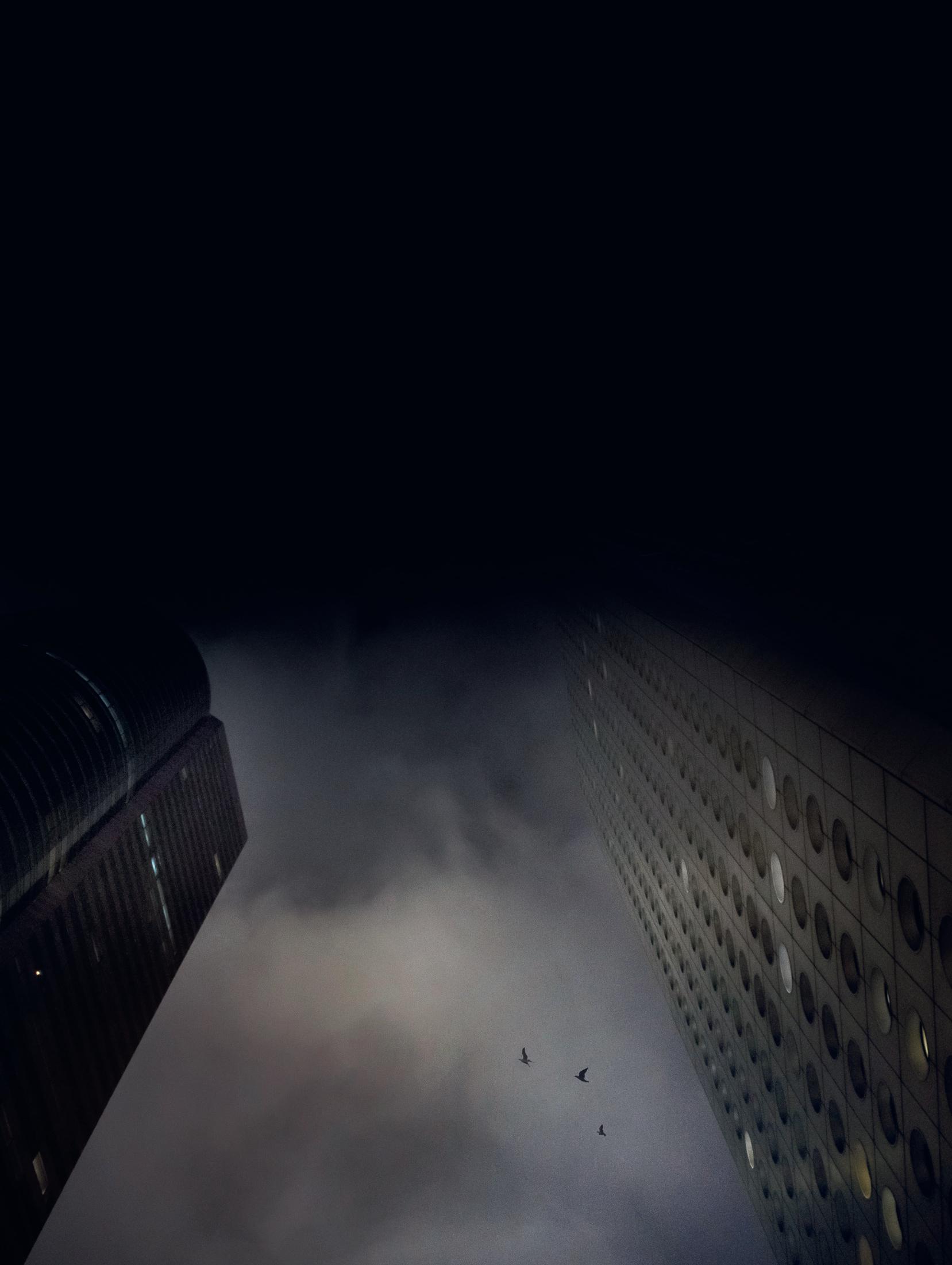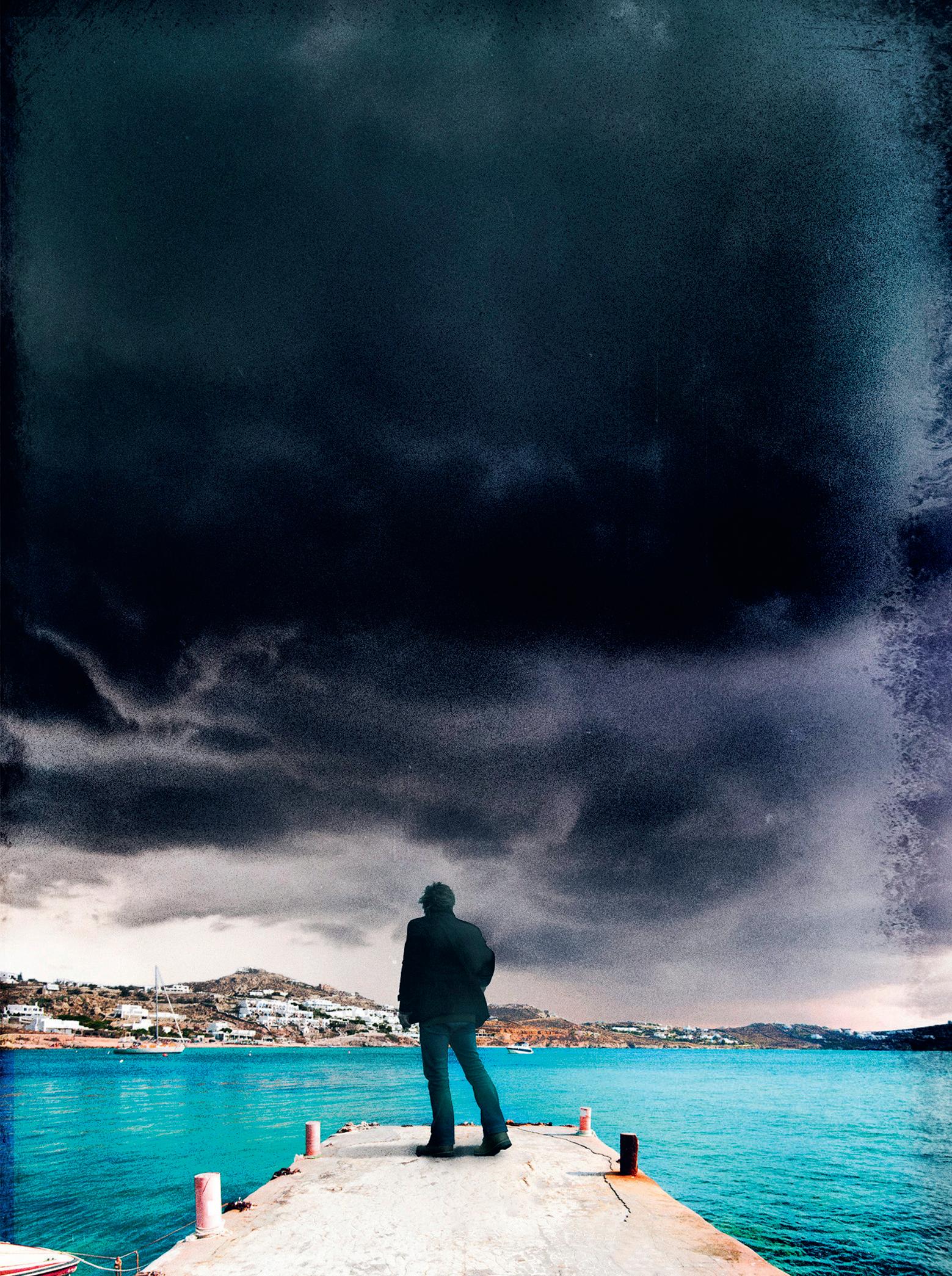




I glanced out at the plane’s wing. Beneath us, bathed in sea and sunshine, lay a sandy- coloured island. Kalymnos.
The captain warned us we might be in for a rough landing and I closed my eyes and leaned back in my seat. Ever since I was a child I have known I was going to fall from the sky into the sea and drown. I can even recall the day this truth came to me.
My father worked for the family firm of which his older brother, Hector, was head. We children loved Uncle Hector because he always brought presents when he came to see us, and let us ride in his car, the only open-top Rolls-Royce in all Athens. My father usually returned from work after I had gone to bed, but that evening he was early. He looked worn out and after tea he had a long phone conversation with my grandfather in his study. I could hear that he was very angry. When I went to bed he sat on the edge and I asked him to tell me a story.
He told the tale of Icarus and his father. They lived in Athens, but they were on the
island of Crete when his father, a wealthy craftsman, made wings from feathers and wax with which he was able to fly. People were very impressed by this and when the father gave the wings to Icarus, he urged his son to fly exactly as he had done. But Icarus was so thrilled at finding himself so high above the ground, that he forgot that it wasn’t his own ability that let him fly but the wings his father had given him. So he flew higher than his father. Icarus came too close to the sun and the wax that held the wings melted. He fell into the sea and drowned.
As I was growing up, it seemed to me that my father’s version of the Icarus myth was meant as a warning. Uncle Hector was childless and it was thought I would succeed him. Not until I was grown up did I learn that, at around that time, the firm had almost gone bankrupt. This was because of Hector’s reckless gambling on the price of gold, and my grandfather had fired him. To avoid public disgrace he allowed him to keep his title and office.
My father then ran the firm and ever since that bedtime story I have had nightmares of falling and drowning. My father was warning me not to take foolish risks. Actually, on some nights the dream seems like something pleasant,
a sleep in which everything painful ceases to exist.
The Greek flag was blowing straight out from the flagpole by the little terminal building as we left the plane, and I heard the pilot say to the stewardess that the airport had just closed.
In the terminal a man wearing a blue police uniform stood in front of the luggage belt and studied the passengers. As I headed towards him he gave me a questioning look and I nodded.
‘George Kostopoulos,’ he said, holding out a large hand. ‘Thank you for coming at such short notice, Inspector Balli.’
‘Call me Nikos,’ I said.
‘Sorry I didn’t recognise you, but there aren’t many pictures of you, and I thought you were older.’
I had inherited from my mother looks that don’t age much with the years and, although my hair was grey, I had kept a fighting weight of seventy-five kilos.
‘You don’t think fifty-nine is old enough?’
‘Well, of course.’ He smiled beneath a moustache of the type men in Athens had shaved off twenty years earlier. But his eyes were mild and I knew I wouldn’t be getting any trouble from George Kostopoulos.
‘It’s just that I’ve been hearing about you ever since I was at the Police Academy, and that seems like a long time ago to me. Any more baggage?’
‘Only this hand baggage,’ I said.
‘We’ve got Franz Schmid, the brother of the missing man, at the station in Pothia,’ said George as we crossed to a small, dust- coated Fiat.
‘I read the report,’ I said, putting my bag on the back seat. ‘Has he said anything else?’
‘No, he’s sticking to his story. His brother Julian left their room at six in the morning and never returned.’
‘It said Julian went for a swim?’
‘That’s what Franz says.’
‘But you don’t believe him?’
‘No. I would have if he and Julian had not had a fight the previous evening, in front of witnesses.’
We turned down a narrow track with bare olive trees and small white stone houses on both sides. ‘They just closed the airport,’ I said. ‘I suppose that’s because of the wind.’
‘It happens all the time,’ said George. ‘That’s the trouble with having the airport on the highest point of an island.’
I could see what he meant. As soon as we got between the mountains the flags hung limply down from the flagpoles.
‘Fortunately my evening flight leaves from Kos,’ I said. The secretary in the Homicide Department had checked before my boss had allowed me to make the trip. Even though we give extra care to the very few cases involving foreign tourists, I was to spend only one working day on it. Usually I was given more time, but even the legendary Detective Inspector Balli was subject to budget cuts. And as my boss put it, this was a case with no body, no media interest and no reasonable grounds to suspect a murder.
There were no return flights from Kalymnos in the evening, but there was one from Kos, a forty-minute ferry ride from Kalymnos, so he had grunted his assent.
‘I’m afraid the boats to Kos won’t be going either in this weather,’ said George.
‘This weather? The sun is shining and there’s hardly a breath of wind except up there.’
‘I know it seems unlikely, but there’s a stretch of open sea before you reach Kos and there have been a number of accidents in weather just like this. We’ll book a hotel room for you. Maybe the wind will have eased off by tomorrow.’
I thought of the few contents in my bag, but perhaps I might be able to get a little well- earned rest here. I’m the type who has to be forced to take a holiday, even when I know I need one.
Maybe being both childless and wifeless is what makes me so bad at holidays. They feel like a waste of time and make me feel lonely.
‘What’s that?’ I asked, pointing. Surrounded by steep slopes lay what looked like a village carved from grey rock. But there were no signs of life.
‘Paleochora,’ said George. ‘In the twelfth century, if the people of Kalymnos spotted enemy ships they would flee up there and barricade themselves in. People also hid there during the Second World War when the Allies bombed Kalymnos because it was being used as a German base.’
‘So a must-see,’ I said.
‘Hm,’ said George. ‘Actually no. It looks better from a distance. It’s overgrown, there’s rubbish, goats, and the chapels are used as toilets.’
But I was, of course, tempted. I always find myself tempted by what rejects me, shuts me out. Women. Human conduct. Murder cases. All the things I don’t understand.
Pothia was a town of narrow one-way streets and alleys. Even though it was nearly November, and the tourist season had ended, the streets were crowded. We parked outside a two-storey house in the harbour area where fishing boats and luxurious yachts lay alongside one another. A small ferry was moored to the quayside and a
group of foreign tourists were discussing something with a man in a naval uniform.
Some of the tourists had rucksacks with coils of rope sticking out from the top flap. Climbers. Over the last fifteen years, Kalymnos had changed from being a sun-and-surf island to a place for sport climbers; but by then I had given up climbing. The man in the naval uniform spread his arms wide to protest that there was nothing he could do.
There were white crests but the waves weren’t dangerously high.
‘The problems arise further out, you can’t see from here,’ said George, who had read the look on my face.
‘That’s often the case,’ I said with a sigh.
George entered the police station ahead of me, and I nodded greetings left and right as we walked through a crowded open-plan office where both the furniture and the bulky computer screens seemed outdated.
‘George!’ called a woman stepping out from her desk. She looked to be about thirty, small and athletic-looking in a uniform with the white ribbon of the tourist police. ‘A journalist from Kathimerini rang. They want to know if we’ve arrested the brother of the missing man. I told them I would ask you to ring them.’
‘Call them yourself, Christine. Say there have been no arrests and that at this moment we have no comment.’
I understood. George wanted to work in peace, and Franz Schmid had made himself available for questioning. He was not under arrest. To avoid rumours it was best to say that the police were talking to anyone who could give them a clearer picture of what might have happened, and that included the missing man’s brother.
George stopped in front of a door. ‘Franz Schmid’s in there.’
‘OK,’ I said. ‘Has the word “lawyer” been mentioned yet?’
George shook his head. ‘We asked if he wanted to call the embassy but he said, “What can they do to help find my brother?” ’
‘Does that mean you haven’t told him that he’s a suspect?’
‘I asked him about the fight, that’s all. But he probably realises we’ve asked him to wait here until you come for a reason.’
‘And who did you say I was?’
‘A specialist from Athens.’
‘Specialist in what? Finding missing persons? Or finding killers?’
‘I didn’t specify, and he didn’t ask, Nikos.’